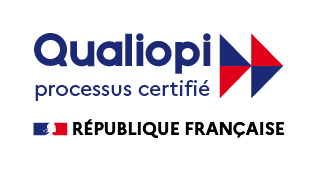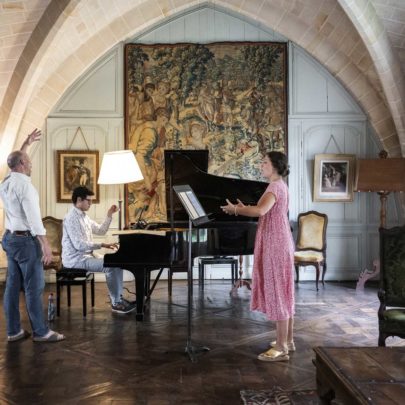Gregorian chant at the École de Notre-Dame
Period
July 15 to 31, 2026
Presentation
The birth and development of polyphony in Paris in the 12th and 13th centuries.
In 1163, when Bishop Maurice de Sully initiated the construction of today’s Notre-Dame Cathedral, Parisian cantors invented a new polyphony. The “Magnus liber organi”, the great book of organum, was intended to “enrich or increase the divine service” in keeping with the dimensions of the new building. Conceived on the basis of Gregorian chant, and alternating with it, it was also at the origin of the development of numerous other polyphonic compositions.
We’ll travel through several centuries of history, entering into the depth and richness of Gregorian chant, and witnessing and participating in the birth and development of polyphony from the 11th to the 13th century. As choir and soloist, we’ll learn to read and sing from medieval manuscripts, from the first neumatic notations in the 10th century to the Parisian manuscripts of the 13th century, in particular the famous Florence manuscript (Pluteus 29.1). In this way, we delve into the musical, poetic and rhetorical wealth of medieval Paris.
Teachers
Sylvain Dieudonné has won numerous prizes at the CNSMDP, and specializes in the study of Gregorian chant and medieval music.
Much of his research work is devoted to studying and restoring the musical heritage of Notre-Dame de Paris.
His activities as choral conductor and teacher at the Maîtrise de la Cathédrale parisienne (1994-2019) have enabled him to forge partnerships with numerous artists and specialist ensembles. In 2020, he became musical director of the Pérotin le Grand ensemble, and in 2022, he was appointed Professor of Gregorian Chant at the CNSMDP.
July 15-17, 2026
Olivier Bettens Historical Latin pronunciation
July 16 to 19, 2026
Raphaël Picazos reading from the sources, medieval polyphony
July 23-25, 2026
Giedrius Gabsys Paleography and Gregorian semiology
July 28 to 31, 2026
Marthe Davost(to be confirmed) singer
Terms and conditions
Audience
10 singers and instrumentalists
Prerequisites and conditions of access to training
- Young professional singer in the final stages of higher education
- Participants formally agree to follow the entire curriculum
- The conditions of access are transmitted during the training.
Duration
- July 14 to 31, 2026 (arrivals on July 13 afternoon and departures on August 02 morning)
- 3 weeks – 19 days (including 2 days off) for a total of 119 hours
- Spotlight on the campus (at Royaumont or in the Val d’Oise region)
- Saturday, July 18 at 3:30 p.m.
- Saturday, July 25 at 3:30 p.m.
- Friday, July 31 at 6:00 p.m.
- Non-remunerated public performances.
Public presentations (at Royaumont and/or in the Val d’Oise region)
Spotlight on Campus
- Saturday, July 18 at 3:30 p.m.
- Saturday, July 25 at 3:30 p.m.
- Friday, July 31 at 6:00 p.m.
Rates
Application
Pre-selection on the basis of applications by the teaching team:
- 1 or more video files related to the chosen course (please note that WeTransfer links will not be uploaded)
- Cover letter
- Short biography (600 characters including spaces)
- CV
- Photo (max: 100MB)
Calendar
- Application deadline:October 12, 2025
Participants formally undertake to complete the entire course.
All Royaumont Foundation training programs have a minimum lead time of 11 working days.
Example: if the Royaumont Foundation validates the registration request on June 14, it can offer the beneficiary a course starting on June 29.
Fiche programme
version n°1 dated 05/2025
Validity of version n°1: 1 year renewable
Course description/content of the training
This new one-session program will combine theoretical and practical approaches, in the form of experimental workshops, creative phases, seminars, meetings, lectures and role-playing, from solo to collective projects.
| Day 1 | Afternoon : reception of beneficiaries | Face-to-face reception, with all the participants in the training. |
| Days 1 to 4 | 10:30am-1pm/14:30pm-6pm: Group lessons, detailed work on each work, definition of aesthetic and technical specificities 6pm>8pm: Meetings, discussion of ideas, personal time… | Sessions led by supervisors and speakers |
| Day 5 | 10:30am-1pm/14:30pm-4:30pm: Group classes, detailed work on each work, definition of aesthetic and technical specificities 6pm-7:30pm: Spotlight on campus: rehearsals open to the public, presentation of the group and the work carried out during the week. | Sessions led by supervisors and speakers |
Number of traines minimum / maximum
Minimum: 10 singers/instrumentalists
Maximum: 12 singers/instrumentalists
Educational objectives
Knowledge
- Analyze a work (form, rhythm, harmony…)
- Understand a sung text in its literal meaning as well as its subtext
- Integrate the pronunciation of sung texts in the language of the period
Expertise
- Efficiently repeat a program in a limited amount of time
- Find your musical and human place in a band
- Acquire the technical tools needed to interpret a specific repertoire, and know when and how to use them.
- Take into account the information provided by a musicologist specializing in a given repertoire to fine-tune your interpretation of a work.
soft skills
- Hearing and understanding managers’ requests and musical suggestions
- Share your interpretation with an audience during public performances
- Exchanging musical ideas with artists with whom we play and defining a common discourse
- Adapt to the demands of a repertoire (pronunciation, musicality of a language…)
Target skills / operational objectives
At the end of the training the beneficiary will be able to :
- Interpret repertoires proposed by the trainer
- Explore monodic and polyphonic pieces, as well as their historical context
- Deciphering scores from different medieval periods
Methods used
Teaching aids :
- Practical, face-to-face teaching in the form of performance classes given by the main instructor in small groups or collectively, depending on the repertoire covered.
- A public presentation at the end of the course (or end of the week) can take the form of a masterclass, a presentation of the entire body of work performed or other…
- It brings together all beneficiaries and does not give rise to remuneration.
Technical resources available :
Rooms are spacious, equipped with music stands (solid or folding), chairs or stools suitable for musicians (without armrests) and, where appropriate, the instruments required for training.
Beneficiaries bring their own instruments and scores, which are not supplied.
Outside lesson times, rehearsal spaces can be made available free of charge, on request and subject to availability.
The abbey monument in its entirety (rooms and gardens)
Documentation via private Drive
Monitoring and evaluation methods
Before training :
- Selection of beneficiaries by the principal speaker and the Royaumont Foundation’s educational director
During the course, face-to-face
- Evaluation of the beneficiary’s responsiveness and ability to quickly integrate the suggestions made by the consultant.
- During on-campus presentations: the performance of one or more pieces in real-life situations before an audience of visitors to the monument enables us to appreciate the evolution of interpretation, as well as emotional and physical postures.
The interview is used to evaluate and guide career choices.
In particular, the following are observed for the beneficiary :
- the quality of physical and gestural ease,
- the relevance of interpretation in relation to historical and musicological analysis,
- accuracy and coherence within the ensemble,
- the relevance of work techniques,
- taking into account the spatial and acoustic configuration of the site,
- the quality of the relationship with the public.
The beneficiaries sign a sign-in sheet for each half-day.
At the end of training
A certificate stating the objectives, nature and duration of the course, and the results of the training assessment, is given to the beneficiary, along with the certificate where applicable.
Qualitative assessment methods
The beneficiary fills in a qualitative evaluation form to assess the artistic, pedagogical, human and material aspects of the training.
A post-training follow-up is established, for which beneficiaries are asked to inform us within six months of the end of the training of any contracts they have obtained.
Accessibility and consideration of disability situations
The Royaumont Foundation has made the acceptance and participation of people with disabilities a strong commitment to its project. Our training courses are open to people with disabilities and different arrangements can be made according to the specificities of each course. To discuss your needs, please contact us when you register, or get in touch with our disability advisors.
The Foundation has :
- Rooms accessible by elevator.
- Screen equipment and amplified speakers.
- Catering on the first floor.
Contact
Pedagogical manager
Jean-Paul Davois artistic director of the scenic unit
jp.davois@royaumont.com
Administrative referent
Catherine Huet stage manager
huet.c@royaumont.com
Logistics referent
Armelle Mousset scenic unit production manager
Disability referents
Samuel Agard and Doriane Trouboul
referenthandicap@royaumont.com
VHSS referent
vhss@royaumont.com
Royaumont Campus 2026

